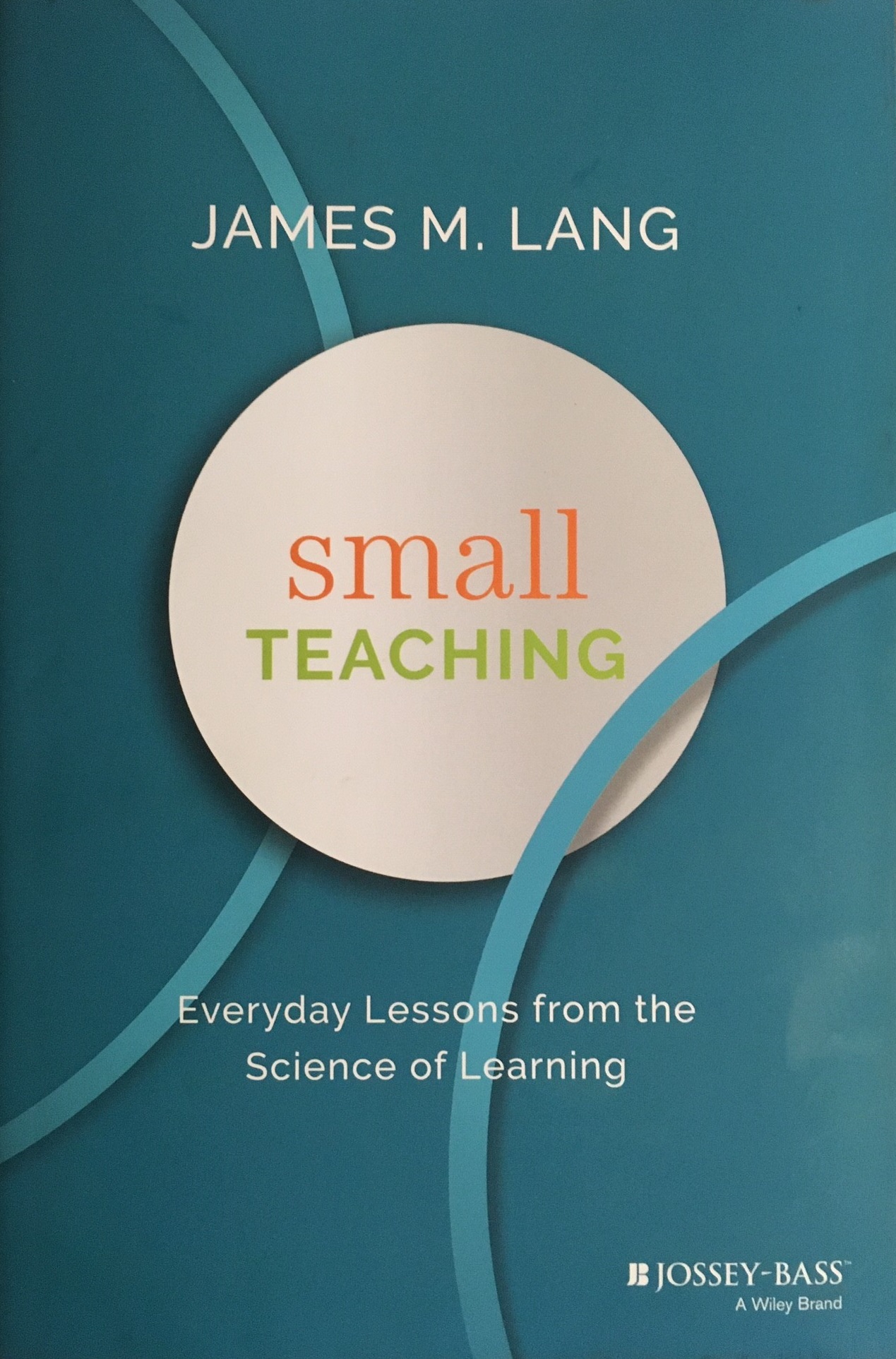Two Takes on James Lang’s “Small Teaching”: How Tiny Changes to Your Teaching Can Boost Student Learning

By Tomeka Wilcher and Annette Finley-Croswhite
In the Center for Faculty Development, we decided that in order to get to know each other a bit better, Dr. Wilcher, our new educational program developer, and I would read a book together. We decided to discuss a recent work by James Lang, professor of English and the director of the D'Amour Center for Teaching Excellence at Assumption College in Worcester, Mass. Lang is a well-known author and frequent contributor to The Chronicle of Higher Education.
The book we chose is entitled "Small Teaching: Everyday Lessons from the Science of Learning," and is focused on implementing small changes to transform one's teaching and to ensure student success within the college classroom. Remica Bingham-Risher, director of ODU's Quality Enhancement Plan: Improving Disciplinary Writing, referred us to the book.
"Small Teaching" draws on research from the realms of cognitive psychology, neuroscience and biology to reveal that simple changes to course design, use of classroom time, and communication with students can help them succeed. Lang's work presents activities that require little preparation but can yield big rewards in engaging students and deepening their understanding.
What follow are several of the strategies we found most intriguing from the book.
Wilcher's choices:
Retrieving
The retrieval effect is the constant practice of retrieving information from one's memory. Through retrieval activities, college and university teachers can provide students with opportunities to retain foundational information. Instead of waiting until the end of the semester to test students, try incorporating small quizzes or formative checks each class. This practice will help students retain the essential information and prior knowledge needed to build upon.
Lang discusses the following retrieval activities, which are small yet beneficial to student performance:
Opening Questions
At the beginning of each class, use opening questions. These questions can help with briefly recapping what was discussed in the previous class or what students read for homework. Opening questions can also have students draw upon their previous knowledge to help connect with what will be discussed and explored.
Closing Questions
At the end of each class, use closing questions. These questions should connect to the opening question. When creating closing questions, focus on the key concepts you want your students to take away from class. This practice provides students with an opportunity to revisit what was discussed. Take time to discuss responses to the closing questions. If there is not time, discuss the responses on a social media platform designated for that course, within the discussion board, or at the next meeting time.
Whether it is an opening question or a closed question, Lang advises college and university teachers to have students write before they discuss, and not to use their notes or textbooks when responding.
Lang also provides suggestions on how to incorporate the retrieval effect within the online environment. One strategy discussed is reading checks.
Reading Checks
Within an online or hybrid course, reading checks should be implemented after a page, section, or chapter. Ensure students are not allowed to move to the next section until they have completed the reading check.
Growing
Lang also focuses on ensuring a growth mind-set in students. You can do this through small interventions: course design, feedback on student work, and communication with students that will yield a growth mind-set. College and university teachers must "create the conditions for internal motivation to flourish."
Two strategies to ensure growth mind-sets are growth-language feedback and growth talk.
Growth-Language Feedback
Lang writes that ability-based praise ("You are a very talented writer!") harms students, especially those with fixed mind-sets, because it deters them from challenging themselves for fear of failure. You should provide meaningful feedback, which should consist of acknowledging the strategies used and providing detailed instructions on what students can do to strengthen their product. As you are giving feedback, ask yourself: Am I telling students that they have fixed abilities? Or am I telling them that they can get better?
Growth Talk
As you communicate with your students, make a conscious effort to include growth talk in every aspect of your communication: syllabus, casual statements in class, assignment sheets, and any forms of written communication. Focus on expressing that, through hard work, effort and perseverance, students can be successful.
Finley-Croswhite's choices:
Practicing
Lang references the importance of repetitive action to become proficient at critical skills and considers his own experiences becoming a better skier. He uses the concept of "mindful learning" developed by Harvard professor Ellen J. Langer to emphasize that in order to learn, students need to be able to create new categories, be open to new ideas and understand multiple perspectives. Such learning is only enhanced with practice, especially as students develop proficiency with lower-level skills and are then confronted with challenges to learn more complex skills. Lang suggests using practice in class to break down major assessments and focus on key cognitive skills. He then recommends instructors develop small teaching moments — or "cognitive activities" — for students to practice either in class or online. Lang states that practice sessions can "nudge students toward mindful learning," and he suggests the following:
Small Teaching Quick Tips: Practice
Brainstorm the cognitive skills you want your students to learn.
Prioritize the basic skills students will need to acquire immediately and which ones will come later in the semester.
Review your syllabus and figure out where you can make time for students to practice. Write this information into the syllabus.
Before any major exam or assignment make sure your students have practiced in class or online the skills they need to succeed in your class.
Personal Implementation
To try out Lang's advice, I thought about incorporating practice sessions into my history class. I require my students, for example, to prepare an abstract for their major writing/research assignment. However, I confront many students who have never written an abstract before. To help them succeed on the assignment, we can practice writing abstracts in class by using some of the material we read by other authors and writing summary abstracts of this material. By the time the students have to prepare their own abstract, they should have had several opportunities to understand how abstracts are crafted. As a bonus of this small teaching technique, the abstracts my students produce in class covering the course reading will also help them to prepare for content material on exams. Lang doesn't use the word "scaffold" in this chapter on practice, but that is essentially what he describes.
Feedback
Lang stresses the importance of feedback, and I especially appreciated these comments in his work. Feedback is so important for students, yet some instructors continue to put grades on assignments without any comments. Assessment without feedback offers no way for students to improve. Lang stresses that feedback need not always be written and formal, however. During practice sessions, he encourages faculty to circulate throughout the room to offer verbal feedback to students. It may not be possible in short practice sessions to offer individual feedback to each student, so it might be best to put students in groups to practice their skills. And after offering individual feedback, instructors can pause and offer collective feedback to the whole class based on the individual observations.
A Final Word
Whether considering Lang's book abstractly as a catalog of new micro-strategies (Wilcher) or more specifically tying his methods to one's own individual courses (Finley-Croswhite), we both found his work intriguing and helpful. Moreover, what Lang offers doesn't require teachers to engage in major course overhauls. One can implement several or all of his suggested small changes in virtually any course and at any time during the semester. We give his book two thumbs up!


